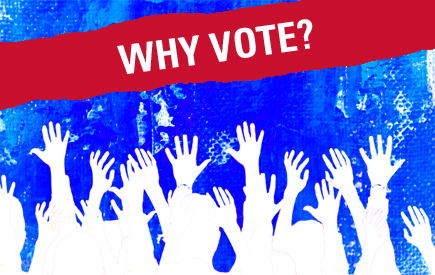By Alyssa Rodriguez, Catt Center student voting engagement intern and Andrew Goodman Foundation Ambassador
 Voting is a key way to participate in our nation’s democracy. It is a simple way to remain civically engaged and is one of the primary ways to amplify your voice as a member of your community. Whether at the local, state, or national level, voting provides several ways to share your opinion and make a difference in the world around you.
Voting is a key way to participate in our nation’s democracy. It is a simple way to remain civically engaged and is one of the primary ways to amplify your voice as a member of your community. Whether at the local, state, or national level, voting provides several ways to share your opinion and make a difference in the world around you.
The decision to vote is a personal choice, but it is important that constituents (you) are informed on the process and history of voting. There are several reasons students and other young people alike choose not to vote. However, several of these reasons can be debunked with some additional discussion! Below are a few of the most common reasons students give for not voting, along with some information to help progress the conversation.
“My vote doesn’t actually count.”
It’s easy to feel this way, especially in larger elections where the voter turnout is so high. However, there have been many elections over history where the results have depended on a small number of votes. Here are just two examples from Iowa elections:
In 2022, Republican Zach Nunn unseated Democrat U.S Rep. Cindy Axne by just over 2,000 votes.
Even in presidential elections, a small percentage of voters can make the difference. This resource provides a list of times presidential election results were neck and neck!
“I don’t know anything about politics!”
This is okay! Participating in elections is about so much more than politics, and fortunately, most candidates are very forward about their platforms—meaning they want to share their opinions with their constituents. Voting doesn’t mean you have to engage in every political discourse; it can be as simple as doing the following:
- Learn the process to vote (it’s a lot easier than you think!).
- Make a voting plan (keeps you prepared and makes Election Day 10x easier!).
- Educate yourself on the candidates. Nonpartisan resources include: ISideWith & Project Vote Smart.
“I don’t care.”
There are several issues at stake each election cycle that impact students and other communities you may be a part of. Popular issues in the 2024 presidential election (so far) include decisions surrounding health care, education, civil rights, and foreign policy. Based on the outcome of the election, decisions may have long-lasting impact on those affected.
For non-partisan updates on hot topics during the election season, follow non-partisan resources such as Ballotpedia. You can also reach out to your family members and friends and discuss what issues are impacting their lives.
Whatever your stance may be, it is important to weigh the issues at hand each election season. Consider how these issues can impact your everyday life, as well as the lives of people around you– and make a plan.
Collective Nonpartisan Resources
Ballotpedia
ISideWith.Org
Politics 1
Project Vote
Smart Vote411
#CyclonesVote